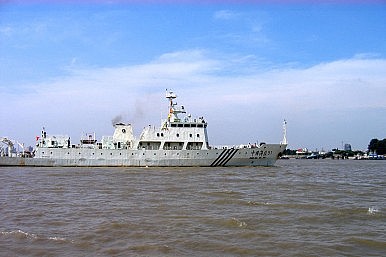China and
the Philippines verbally
clashed over the South China Sea this week, with Manila
accusing China
of harassing both fishermen and a military patrol in the disputed maritime
region.
On Tuesday, the
Philippines said that the Chinese
Coast Guard
used water cannons on a group of Filipino fishermen at
Scarborough Shoal, damaging some of the fishermen’s boats. Hong Lei, a
spokesman for
China’s
Foreign Ministry said the Chinese vessels were performing “guard duty in waters
off the
Huangyan Island [the Chinese name for Scarborough
Shoal] to maintain the normal order of these waters in accordance with the
law.” Hong added that
Manila should “show
earnest respect for
China’s
territorial sovereignty, step up its regulation and education of the fishermen
and stop all actions infringing upon
China’s territorial sovereignty,
and rights and interests.”
The Philippines
effectively lost access to the Scarborough Shoal after a tense standoff between
Chinese and Philippines
vessels in April 2012. Since then, China’s Coast Guard has maintained
tight control over the area, but Philippine fishermen still attempt to reach what they claim as their traditional
fishing grounds.
The plot thickened on Thursday, when the
Philippines’
fisheries bureau said Chinese Coast Guard officers had
robbed Philippine fishermen in a separate incident near
Scarborough Shoal on April 11. The fishermen “were threatened and pointed [at]
with a gun before the Chinese forcibly took their fishes,” the bureau said in
an incident report sent to AFP. The report also indicated that the Chinese
sailors destroyed fishing equipment and other materials on the boats.
Asked about those claims, Hong said that the “accusations made by the Philippine side
are inconsistent with the fact[s].” He then repeated
China’s
argument that its vessels in the area “perform guard duties and keep order in
waters off the
Huangyan
Island in accordance with
the law.”
In a more serious incident, a Chinese frigate warned away a
Philippine Air Force plane while the latter was on a military patrol. A
Philippine air force official
told Reuters, “An Air Force Fokker plane was
challenged by a Chinese frigate near Subi Reef, aiming a powerful light as it
flew over the disputed area.” Another officer said that the Chinese vessel also
warned the Philippine plane to leave the area in a radio message.
Subi Reef, occupied by
China,
is one of several disputed islets where
Beijing
is conducting
land reclamation activities. Subi Reef is of particular
concern to
Manila as it is only 25 km away from
Thitu Island,
where the
Philippines
have their only airstrip in the Spratlys.
Hong also waved aside this incident in a press conference,
saying China
has “verified that the relevant report is not true.” For one thing, Hong said,
“There is no such thing of [sic] powerful light warning as mentioned in the
report.” But Hong did verify that Chinese soldiers had warned off Philippine
aircraft. “[P]lanes from the Philippines
have conducted multiple intrusions into the area above waters near China’s islands
and reefs over recent days,” Hong said. “The Chinese garrison there took actions
in accordance with the law by asking them to leave through radio.”
The rash of run-ins in disputed territories – whether
between coast guard and fishermen or, more worryingly, between military vessels
and aircraft – serves as a further reminder of the risks of an accident or
miscalculation on the ground leading to tragedy and possible armed conflict.
For now, however, the war is being waged with words, as each sides airs
accusations and counter-accusations.


No comments:
Post a Comment
Note: Only a member of this blog may post a comment.